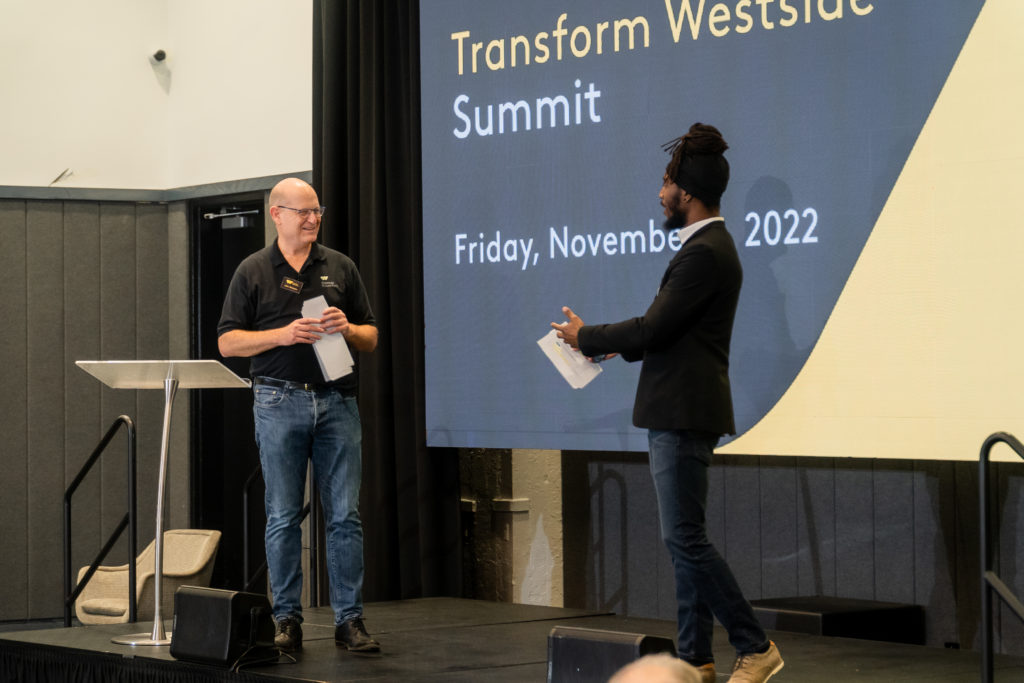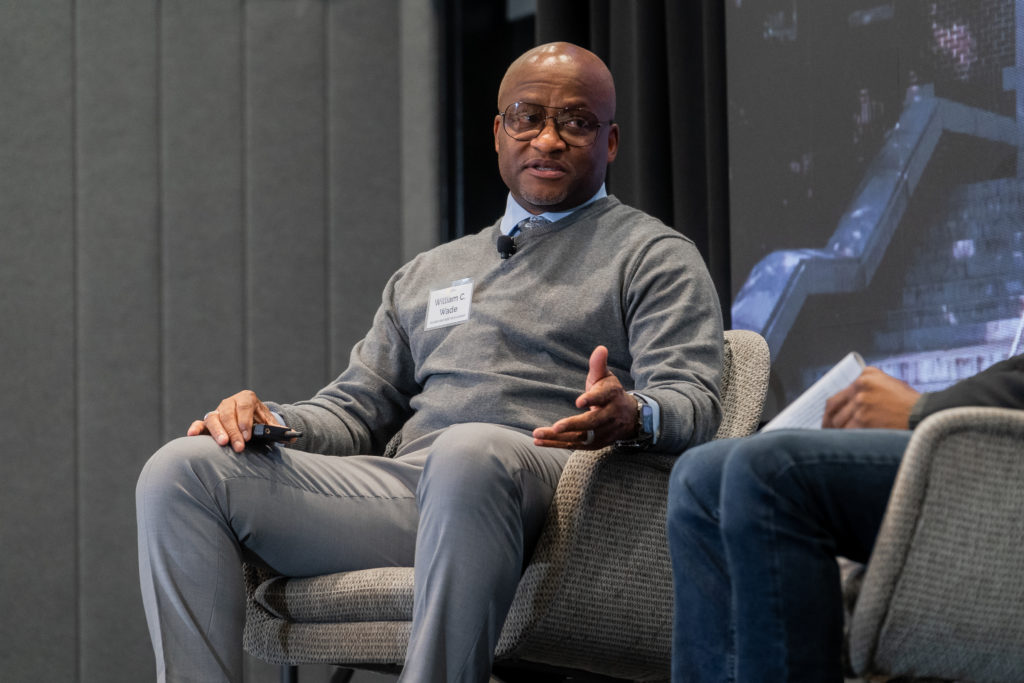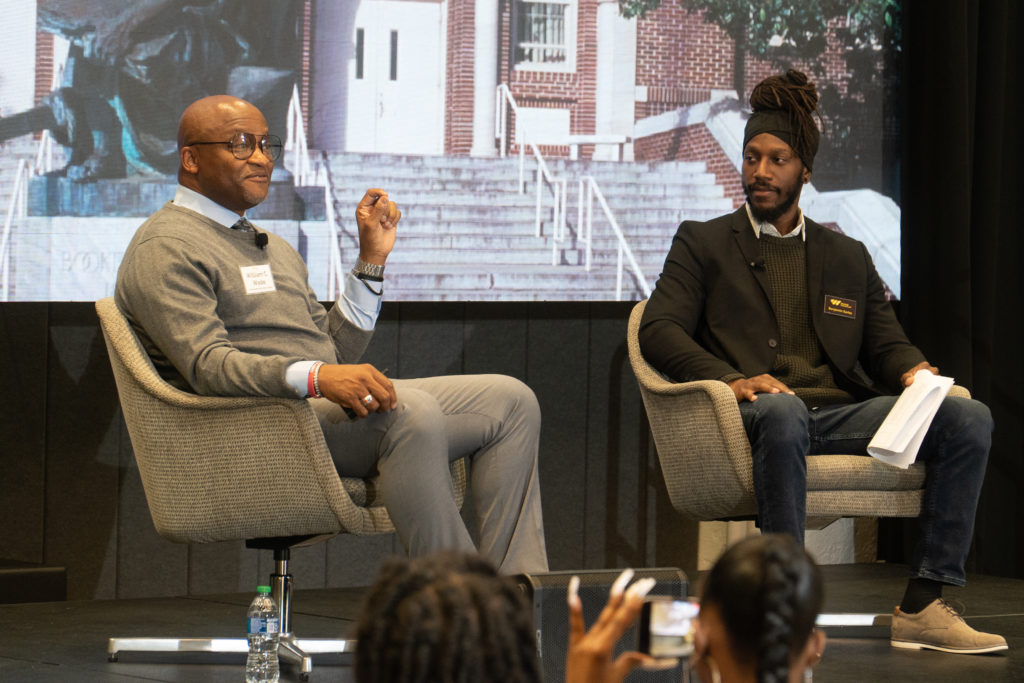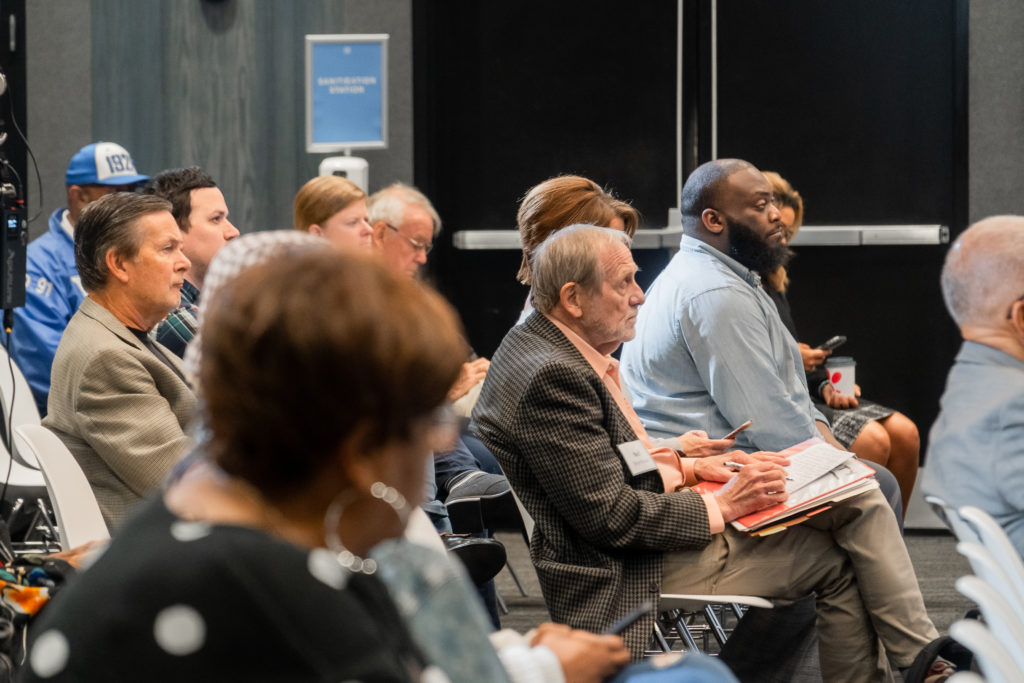November 4th Transform Westside Summit: Highlighting Booker T. Washington’s Principal William Wade
Westside Future Fund’s November 4th Transform Westside Summit highlighted Booker T. Washington High School’s Principal William Wade. Wade, with 32 years of experience bringing equitable change and accessibility to urban school systems across the country, answered the call to lead one of the south’s most historic high schools. John Ahmann, WFF’s President & CEO, opened the program alongside 4th generation Westside resident Benjamin Earley, who’d go on to moderate the featured discussion with Principal Wade.

WFF President & CEO John Ahmann (left) shared laughs with co-host Benjamin Earley while welcoming summit attendees.
Earley: “You spent years as an administrator at Douglass High School, before continuing your career in many different places. And now you’ve brought your skill set back to the Westside to Booker T. Washington. What inspired you to answer the call to come back to the Westside for education?”
Wade: “It’s great to be here speaking with all of you this morning to talk about our journey towards success and perfection and Booker T. Washington High School. Well, I’ve had a long journey as Benjamin mentioned, and my career started in urban Memphis City Schools and Shelby County, Memphis, Tennessee, where I served a very similar demographic that I serve here in Atlanta and on the Westside.”

Booker T. Washington High School Principal William Wade shares major impacts from his first 10 weeks of leading BTW.
Wade: “I left to work in higher ed at Coahoma Community College, the only two-year historically Black college in the country. It’s in Clarksdale, Mississippi, which is where I graduated from after leaving Chicago. I went back to serve as the Director of Educational Outreach. That means I went out and I had to package education and take it to people who couldn’t get to us. And so I worked with all the high schools in the five counties that fed into the community college and with dual enrollment. I was over all the adjunct professors, but I did not feel the connection that I felt in K-12 education in our urban settings. So this call came and I knew I could not turn my back on the Westside of Atlanta.”
Earley: “Something that is very, very, very important when you talk about the Westside is cultural competence. That is a huge factor in actually making an impact in the lives of students and families. What is it that allows you to bridge that gap, that allows you to bond? What have you found successful that has allowed you to make the connection with the students here on the Westside?”

Principal Wade (left) relates his experience as a Chicago youth to that of his students today.
Wade: “I’m from the same demographic, Ben. I’m from Chicago, Illinois, product of Chicago Public Schools—same demographic on the south side of Chicago, same challenges. I knew then as a student if I wanted to be successful, I had to have tunnel vision, and I had to tune out all the noise around me, right? All the noise that comes with being an urban teenager in high school, urban student, urban setting… I knew that as an educator, I probably couldn’t work in suburban America. That cultural competence piece would be going against me at that time. So, I wanted to work with populations that I was very familiar with, and that’s what I was able to find Memphis, TN, Atlanta, GA, and Philadelphia and Pittsburgh—because they all were me. Younger versions of me.”
“The first two or three weeks of school, I had to build relationships. I really intentionally went out to build relationships with teachers and students alike, letting them know that I was genuine and it was organically really working that I was there. To really stand in the gap to help them. No other place is better for me than urban America and the Westside of Atlanta, which I’m very familiar with.”
Earley: “Mayor Dickens, who we had on a couple of weeks ago, made a commitment to ending racial inequities in Atlanta through Neighborhood Improvement Strategies. As an expert in education, what are some of the priorities that you see as necessities to make it a more level playing field for Black and brown students inside the classroom?”
Wade: “I want to make sure that we focus on increasing our parental involvement numbers. Increasing our attendance numbers; increasing our partnerships, which is what we’re doing; increasing our mental health, which is what Atlanta Public Schools has really taken a lot of time with—making sure that we’re serving the full child… we have partnered with Hazel Health. We’re going to have telehealth services in our school to serve our students physically and mentally. The rollout is happening right now. I think that that is very equitable across the board, which will allow our students to be successful in the classrooms. We can’t start talking about numeracy and literacy until we level the playing field with the things that get in the way of learning.”

Transform Westside summits are free and open to the public.
Wade: “We’re going to continue to make sure that we level the playing field so that our students can have a fighting chance moving forward. Making sure that our students are effective in a pluralistic setting, not just in the Atlanta area…That, we can leave here and we can tell everyone what our students look like, what a graduate looks like from our cluster of schools…. that that’s going to be a norm.”
Earley: “Booker T. Washington, we’ve mentioned it, as you know, the first high school for African Americans in the southeast. Alma Mater of iconic civil rights legends like Dr. King, what does it mean to be entrusted with that legacy?”
Wade: “I really am honored to stand on the shoulders of such great giants while I do this work. You know, I’ve been a principal before, and I elevated above the principalship. Now I’m back. And that’s the reason why I’m really back because I couldn’t pass the opportunity to lead this historical great institution… I have to make sure that we compete against a world that’s totally different than when I went to school—a world that will really distract our students if we’re not very intentional about the work that we’re doing at our school. So that’s the challenge that I face and that’s going to be my legacy. Upon my exit, they will know, everyone will know, that my team of administrators and teachers alike and parents and students and community members, we really held a hill to serve and made sure that our students competed on a global level through technology and innovation because that’s the new piece that we have to bring forward. That was not in existence 100 years ago.”
Earley: “What are some of the biggest needs for Booker T. Washington right now?”
Wade: “After we establish the vision and culture of the STEM movement that we’re trying to do and all the support that we need with that, we want to make sure that everyone understands what’s the output, what’s the student outcomes… Having everyone understand our maps assessments, our milestone assessments, our ACT scores. What do these big high stakes test scores mean? What does it mean for the community? What does it mean for our parents?”
Earley: “The flip side of that question would be what are some of the greatest hindrances?”
Wade: “I think the biggest hurdle that we’re facing right now is mental health in our community. Some of our young people and families are facing tons of traumatic incidents that distract them. We face it in the school and other schools around the country. The trauma comes to us every day, and how do we deal with it? I have seen that the Black and brown communities, it’s not cool for us to accept the challenges that we’re going through it’s not a norm for us to seek help. It’s just not a norm and those things can get in the way of learning and get in the way of progress. So that goes back to Hazel Health, not only commendations, but we should also really applaud the efforts of the Atlanta Public Schools Board by preparing for partnering with Hazel Health. Now, we have to get people to use it right. We’re going to have these safe spaces in all of our schools. How do we bring more attention to making young people and families comfortable with saying, ‘hey, I need help’?”
View the full summit including the audience Q&A below!
